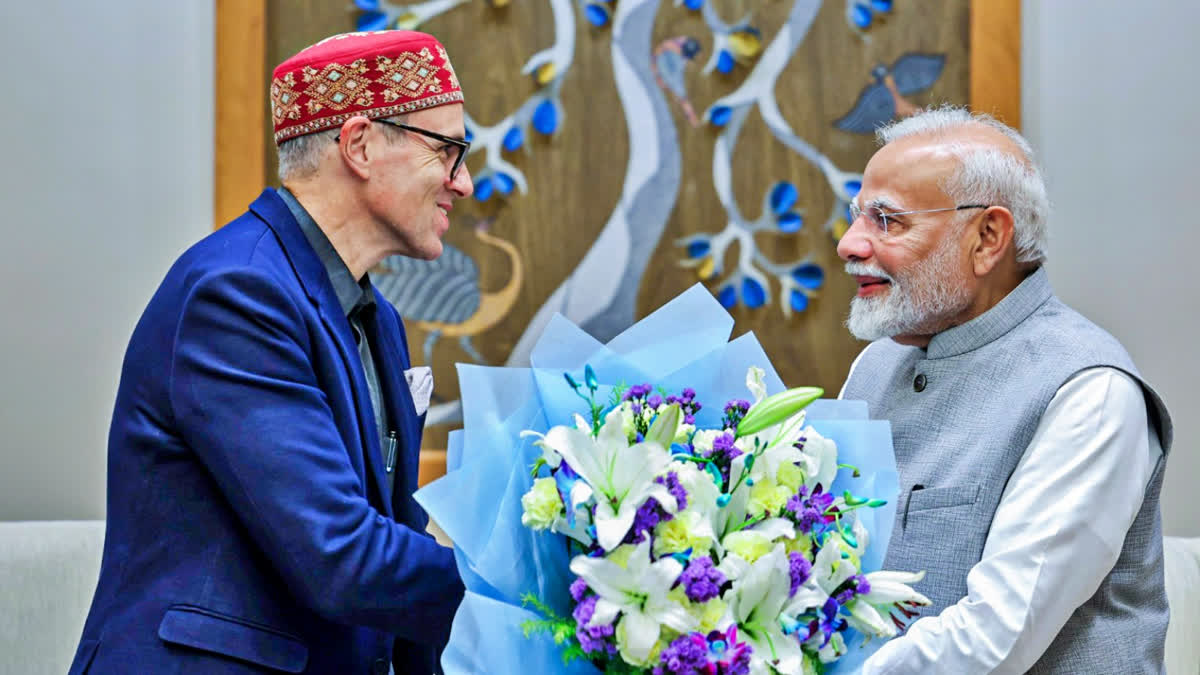Srinagar: Hosting the maiden session after a gap of more than six years next week, the Jammu and Kashmir Legislative Assembly is expected to witness a resolution moved by the treasury benches against the abrogation of Article 370 by the government.
Jammu and Kashmir L-G Manoj Sinha has called the session of the Legislative Assembly on November 4. The resolution to be moved by the government in the 90-member lower house will mark the first formal opposition to the August 2019 decision by the Bharatiya Janata Party-led government in the Parliament.
“We are determined to move the resolution on Article 370 in the house in the first session,” a source said. “We are not digressing and will deliver what we promised in our manifesto. The resolution will demand the restoration of Article 370 as it was an unconstitutional move."
The resolution is expected to be moved by Chief Minister Omar Abdullah, who is also holding the Law and Parliamentary Affairs portfolio, the source told ETV Bharat. It will, according to the source, demand the central government to restore erstwhile Jammu and Kashmir as existed before August 5, 2019, which means the inclusion of Ladakh with J&K.
Jammu and Kashmir was downgraded to a union territory with the legislature, but Ladakh was hived off as a separate Union Territory without the house. This is the maiden legislative assembly session since the abrogation of Article 370 in August 2019 after the previous state legislative assembly was dissolved by then-Governor Satya Pal Malik in November 2018, paving the way for direct central rule since then.
On August 5 2019, the Bharatiya Janata Party-led government annulled Article 370 granting special status to Jammu and Kashmir in the Parliament. The move also abrogated Article 35A which empowered the J&K legislature to define the state’s permanent residents and did not allow outsiders state subject rights.
In its first cabinet meeting on October 17, the Omar Abdullah government passed the resolution on statehood to Jammu and Kashmir but did not touch Article 370 as per the legal procedure. Article 370 is the domain of the legislature, the source said, adding that statehood falls under the government. The chief minister presented the resolution to Prime Minister Narendra Modi and Home Minister Amit Shah, pushing for statehood, during their meeting in the national capital last week.
A senior National Conference leader said the resolution will be moved by the government and will be put to a voice vote by the speaker. The ruling National Conference fought the election with the restoration of Article 370 as a key poll plank and secured a thumping victory with 42 seats, a first since the elections in 1996. Besides, its allies comprising Congress and independents took the tally of the treasury benches to 55, a number with which they can comfortably pass the resolution.
While the ruling party concedes BJP will be averse to the move, it expects opposition legislators from Kashmir including three members from Peoples Democratic Party and Sajad Lone to support the resolution. Normally, the procedure to move a resolution involves submitting it by an elected legislator to the Speaker, who can accept or reject it.
Once accepted, the speaker will put the resolution to vote and those in favour will say ‘Aye or those against it will say ‘No’. Usually, a government-backed motion is moved by the law and parliamentary affairs ministers and it is put to test vote by the speaker on the day resolutions are taken up.
If the resolution is moved by the chief minister or a minister, it will have the stamp of the government. But if a legislator of the ruling party moves a resolution, it will be considered a private members' bill unless supported by the treasury benches.
While the resolution is not legally valid and hence not binding on the centre, it has the potential to ‘strain’ the Abdullah-led government’s relations with New Delhi. A senior BJP leader said while they look ‘positively’ at Omar Abdullah’s first meeting as chief minister with Prime Minister Narendra Modi and Home Minister Amit Shah in New Delhi last week, the resolution might not go well with them and will be opposed ‘tooth and nail’ both inside the House as well outside.
In November 2023, the Supreme Court upheld the Article 370 abrogation in its verdict. In 2000, the National Conference led by Farooq Abdullah had passed a resolution in the legislative assembly demanding autonomy and the 1953 position to Jammu and Kashmir. However, the resolution was rejected by the then-government led by Prime Minister AB Vajpayee.
Read More



